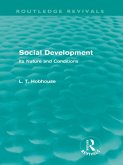The book traces the formation of a class society back to the patterns of 'surveillance power' and control, and shows how these patterns preceded and made possible the industrial system. Subsequently 'economised' into the industrial system, these same patterns of control have now proved to be inadequate under social conditions brought about by this economisation of the power conflict.
Dieser Download kann aus rechtlichen Gründen nur mit Rechnungsadresse in A, B, BG, CY, CZ, D, DK, EW, E, FIN, F, GR, HR, H, IRL, I, LT, L, LR, M, NL, PL, P, R, S, SLO, SK ausgeliefert werden.









